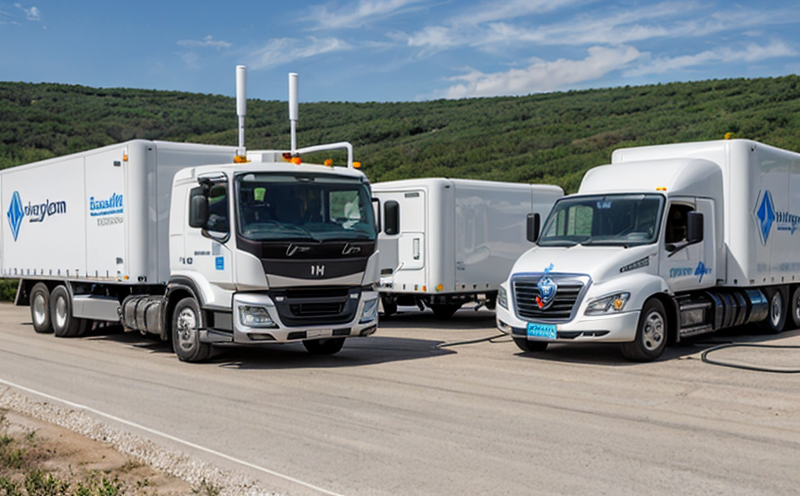EN ISO 21087 Hydrogen Analytical Measurement Testing
The CEN standard, EN ISO 21087-1 and EN ISO 21087-2, provides a comprehensive framework for the analytical measurement of hydrogen quality in various industrial applications. This service is critical for ensuring that hydrogen meets stringent purity levels required by industry standards and regulatory requirements.
The process begins with the collection of hydrogen samples from production facilities or distribution networks. These samples are then prepared according to specified procedures laid out in ISO 21087-2, which ensures consistent and accurate measurement results. The analytical methods used encompass several key techniques including gas chromatography (GC), Fourier transform infrared spectroscopy (FTIR), and mass spectrometry (MS). Each method offers unique advantages depending on the specific analyte of interest.
Once samples are prepared, they undergo rigorous testing to determine their compliance with international standards such as ISO 21087-1. This includes evaluating key parameters like water content, carbon monoxide and dioxide levels, hydrogen sulfide concentration, and impurity limits. Compliance with these stringent specifications is essential for maintaining product integrity and ensuring safe operation in energy systems.
A significant advantage of this service lies in its ability to detect trace amounts of contaminants that could compromise the performance or lifespan of fuel cells or other hydrogen-based technologies. By identifying even minor discrepancies early on, companies can take corrective actions before issues escalate into larger problems. This proactive approach not only enhances operational efficiency but also contributes significantly towards sustainability goals by minimizing waste and resource consumption.
The results from EN ISO 21087-1 testing are reported meticulously using standardized formats that align with international guidelines. This ensures clear communication between stakeholders involved in hydrogen production, distribution, and utilization processes. Accurate reporting facilitates informed decision-making regarding quality control measures necessary to maintain consistent product performance across different stages of the supply chain.
In summary, EN ISO 21087-1 Hydrogen Analytical Measurement Testing plays a vital role in ensuring high-quality hydrogen for use in energy systems and renewable energy applications. Its importance cannot be overstated given the increasing demand for clean, efficient power generation methods that rely heavily on hydrogen's unique properties.
- Ensures compliance with international standards
- Detects trace contaminants early
- Enhances operational efficiency
- Contributes to sustainability goals
- Maintains consistent product performance
Why It Matters
The quality of hydrogen directly impacts the reliability and safety of energy systems utilizing this fuel. Poorly controlled impurities can lead to premature degradation of critical components, reduced efficiency in fuel cells, and potential hazards during transportation or storage. Therefore, accurate measurement is paramount for maintaining optimal performance throughout the entire lifecycle of hydrogen-based technologies.
Moreover, compliance with international standards like EN ISO 21087-1 demonstrates a commitment to excellence and trustworthiness among partners and customers alike. In an increasingly competitive market where environmental responsibility is a key factor, such adherence underscores a company's dedication to sustainability practices. This not only boosts brand reputation but also opens up new opportunities for collaboration with like-minded organizations.
For research and development teams working on innovative hydrogen solutions, this testing service provides invaluable insights into the behavior of different types of hydrogen under varied conditions. By understanding how variations in purity affect performance outcomes, engineers can design more efficient systems tailored specifically to meet evolving market needs while ensuring long-term viability.
In conclusion, rigorous EN ISO 21087-1 Hydrogen Analytical Measurement Testing is essential for safeguarding the integrity of hydrogen used across various sectors. It supports operational excellence, enhances safety standards, promotes sustainability initiatives, and fosters innovation in green energy solutions.
Why Choose This Test
- Guarantees compliance with international standards
- Identifies trace contaminants early to prevent operational issues
- Supports safe transportation and storage of hydrogen products
- Demonstrates a commitment to quality and sustainability practices
- Promotes innovation through detailed analysis of different types of hydrogen
- Aids in meeting regulatory requirements and industry expectations
- Ensures consistent product performance across the supply chain
- Builds trust with partners, customers, and stakeholders
Selecting this testing service ensures that your organization meets the highest quality standards for hydrogen production, distribution, and utilization. By choosing us, you invest in a future where reliability, safety, and environmental responsibility go hand-in-hand.
International Acceptance and Recognition
The EN ISO 21087 series has gained widespread acceptance and recognition within the global hydrogen industry. It is widely adopted by organizations committed to delivering clean, efficient energy solutions. Compliance with these standards provides assurance that all processes related to hydrogen handling are conducted in a safe, reliable manner.
Many leading companies across sectors including renewable energy, automotive manufacturing, and infrastructure development have implemented EN ISO 21087-1 testing protocols into their quality management systems. This not only enhances their own operations but also facilitates seamless integration with international partners who adhere to similar standards.
The standard's robust framework has been praised for its comprehensive coverage of analytical methods applicable in various environments where hydrogen plays a crucial role. Its flexibility allows it to accommodate evolving technological advancements without compromising on core principles of accuracy and precision.
Furthermore, adherence to EN ISO 21087-1 fosters collaboration between entities operating within different geographical regions by establishing common benchmarks for measurement practices. This promotes consistency in hydrogen quality across borders and supports international trade activities involving hydrogen products.
In summary, the global recognition of EN ISO 21087-1 underscores its significance as a cornerstone standard for ensuring high-quality hydrogen throughout its lifecycle. By embracing this testing service, organizations contribute to advancing best practices within their respective industries while benefiting from enhanced reputation and trustworthiness among stakeholders worldwide.





